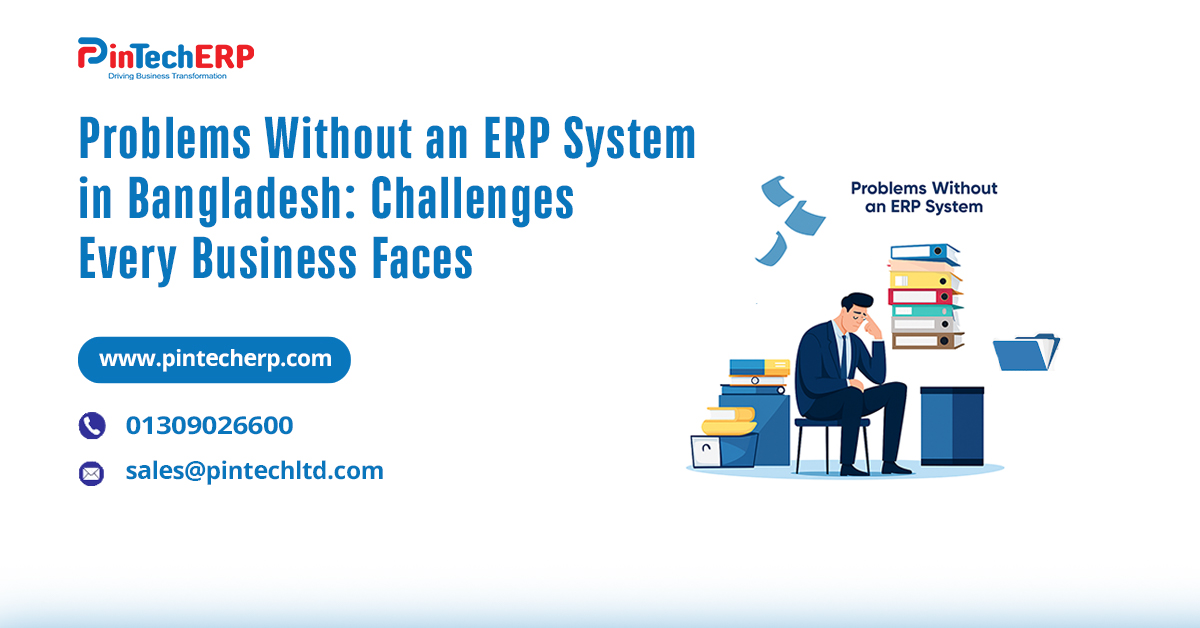Running a business today is not easy. The market is fast, competition is strong, and customers expect quick service. In this situation, many companies still ask: can organizations succeed without an ERP system? Technically yes, maybe for a short time. But very soon, Problems Without ERP System in Bangladesh: Challenges Every Business Faces .
At PinTechERP, we have seen how companies struggle when they don’t use an ERP. The truth is simple – without ERP, businesses lose time, money, and even customers. In this blog, we will explain the problems that a business can face without an ERP system, why ERP is important, and how our solution can help you overcome these challenges.
We will also answer common questions like what problems ERP systems help companies solve. Why do businesses need ERP? What are the benefits of ERP for businesses? And many more. By the end, you will understand why so many SMEs and large companies in Bangladesh are choosing PinTechERP.
Problems without ERP System
Let’s talk about the real issues first. These are the challenges faced by businesses without an ERP system:
-
Scattered Data Everywhere
every department has its own file, its own Excel sheet, its own software. The sales team keeps one record, accounts keep another, and HR has a different one. Nothing connects. This creates confusion and data silos. Management doesn’t get the full picture.
-
Too Much Manual Work
Without ERP in your SME, challenges you face include manual data entry, repeated reporting, and copying information from one file to another. This wastes hours every week. Plus, mistakes are very common.
-
Inventory Mess
For manufacturing, this is a big issue. Challenges of manufacturing without an ERP system are huge: overstocking, stock outs, not knowing what is in the warehouse, poor purchase planning. A lot of money is lost here.
-
Weak Financial Control
Without ERP, budgets are hard to track. Invoices may be delayed, payments missed, cash flow not clear. Business leaders cannot see where the money is going.
-
Bad Customer Experience
Orders get delayed, delivery is late, and the customer service team doesn’t have the right info. Customers feel ignored. Slowly, they move to competitors.
-
Slow Decision Making
When reports are late or wrong, management decisions are also slow or wrong. How ERP systems affect business decision-making is clear – with ERP you get real-time reports. Without it, you rely on guesswork.
-
Compliance and Security Risk
Data is stored in files, drives, or outdated systems. Easy to lose, hard to protect. Meeting tax and audit requirements is painful.
-
No Room to Grow
A small company might manage with spreadsheets. But once you grow, hire more staff, open new branches, or add new products, the old system breaks down.
These are not small issues. They directly affect profit, growth, and reputation.
Can Organizations Succeed without the ERP System?
A common question is – “what if we don’t use ERP, can we still succeed?” The honest answer: for very small setups, maybe yes. But once a company grows, the 9 ways your company suffers without ERP become visible:
- Costs increase
- Errors damage trust
- Customers complain
- Reports are late
- Teams fight over wrong data
- Managers get frustrated
- Growth slows down
- Compliance issues appear
- Competition moves ahead
So, you might survive without ERP, but you won’t grow the way you want.
What Problems Do ERP Systems Help Companies Solve?
This is where PinTechERP by Pinovation Tech Ltd. comes in. ERP is not just software; it is a solution. It connects all your departments in one platform. So instead of ten separate systems, you have one system for everything.
Here’s how ERP improves business processes:
- Sales, accounts, HR, supply chain, production, all connected.
- Reports available in real time.
- Less manual work, more automation.
- Inventory controlled properly.
- Customer service improved.
- Compliance made simple.
Why Do Businesses Need ERP?
Simple answer: to stay competitive and profitable.
Think about it: if your competitor can deliver faster, manage inventory better, and serve customers more efficiently, why will customers stay with you? That’s why companies are forced to have an ERP suite.
And not only just big companies. Even SMEs in Bangladesh are now realizing this. ERP is no longer optional.
Benefits of ERP for Businesses
ERP helps in many ways. Let’s check out what ERP aims to achieve and the key advantages of implementing an ERP system in an organization:
- Centralized Information – One place for all data. No silos.
- Efficiency – Automates manual tasks, saves time.
- Inventory Control – Less wastage, fewer shortages.
- Financial Accuracy – Real-time budgeting and accounts.
- Customer Service – Faster response, happier customers.
- Growth Support – Scales with your company.
- Better Decision Making – Live dashboards and KPIs.
This is how ERP creates value for businesses.
Problems with ERP Systems (and How PinTechERP Solves Them)
Yes, even ERP systems have some drawbacks. Many people ask: what are the three disadvantages of ERP?
- High cost at the start.
- Complex implementation.
- Employee resistance to change.
But with PinTechERP, these are reduced. Why?
- Pricing is flexible and made for SMEs.
- Quick implementation with local support.
- User-friendly interface with proper training.
That’s why some companies have more success with ERP than others – the right vendor matters.
PinTechERP: The Right Choice in Bangladesh
Now let’s talk about PinTechERP. Why is it trusted?
- It is designed for Bangladeshi businesses.
- 100% web-based, easy to access from anywhere.
- Modules for accounting, HRM, supply chain, CRM, manufacturing, fixed assets, project management.
- Highly customizable, fits your process instead of forcing you to change.
- Strong data security and compliance features.
- Fast implementation and 24/7 support.
This is not just theory. Many businesses have already chosen PinTechERP and seen big improvements in performance.
How ERP Systems Affect Organizational Performance
ERP changes the way a company works. It improves cycle time, reduces costs, and gives better output. Managers can see what is happening right now, not yesterday.
This is why ERP systems help a company reduce costs and why ERP is linked to better performance overall.
What Size Company Needs an ERP?
- Small businesses: If you have multiple departments and manual work it slowing you down.
- Medium businesses: If you’re growing fast and data is scattered.
- Large businesses: If you need control, compliance, and advanced modules.
Basically, if you want to grow without chaos, you need ERP.
Success Factors of ERP
The secret is simple. For ERP success you need:
- The right software.
- The right vendor.
- Proper training.
- Step by step implementation.
PinTechERP supports you in all of this.
Why Wait? Let’s Get Started Together
By now you can see the challenges faced without an ERP system in business are not small. They are daily struggles that cost money, time, and customers.
And you also know what problems ERP systems help companies solve, how ERP systems affect business decision-making, and how ERP creates value for businesses.
So, the question is not “should I get ERP?” The real question is: “how much is it costing me to run without ERP?”
With PinTechERP, you don’t need to worry about huge cost, long time, or difficult setup. We are local, we understand your business, and we give you the support you need.
👉 don’t wait until problems get bigger. Book a demo with PinTechERP today and see how your company can save money, improve efficiency, and grow faster.












